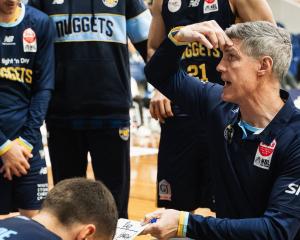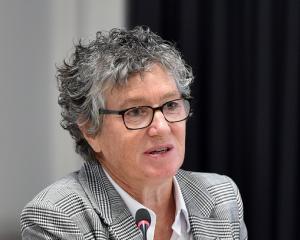

After spending the past three weeks back home training, the Dunedin Paralympian is ready to get to work overseas.
Grimaldi, 27, will spend the first few weeks based in Leverkusen, Germany, training alongside German Paralympians and taking part in at least two competitions.
Then she heads to Loughborough, England, where she hopes to compete in August, before heading to the south of France for more training, and later Montpellier for New Zealand’s Paralympics pre-camp.
It is a busy, but important, schedule for the long jumper — who also spent time overseas before last year’s world championships, where she jumped a personal best of 5.96m — and one she felt was right for her buildup.
There were many reasons behind heading overseas early.
Warmer weather played a part, as the Dunedin temperatures made it hard to be explosive outside and tweak things technically, and being able to take part in competitions was also vital.
It was also important she knew how to "run her own ship" before the pinnacle event at the end of August.
"It gives me a bit of a chance to really knuckle down and go ‘right, what’s important now?’ heading into the Games without the clutter of everyday life," Grimaldi said.
It has been a strong past 18 months for Grimaldi, who won back-to-back long jump silver and 100m bronze medals at the world championships in 2023 and earlier this year.
Last year was a dream, but the past six months had been tough as she battled injuries and spent little time jumping.
She was nervous at this year’s world championships, but walking away with silver gave her confidence.
"Everything doesn’t have to go right for me to be able to perform.
"To know that can be done with not very much jumping, not feeling completely prepared, or that confident ... to know that [jump] is there in those circumstances, I’m really excited now."
That confidence has not always been there, though.
After winning gold in Rio, and again in Tokyo, Grimaldi struggled with her identity and felt to be a Paralympic champion she had to keep winning.
She was uncomfortable when people would ask how she won, and who she was, because inside "I think I didn’t really know".
"Now I do.
"I know who I am, I know what I stand for, what I want to achieve and how I want to do it.
"That’s been really freeing.
"It’s really nice to see my confidence grow in the now, but also for the things that I’ve already done, that potentially I wasn’t able to fully enjoy all corners of it because I was not feeling super confident in myself."
Now she stood tall knowing she was a double Paralympic champion no matter what happened.
"The results in Paris ... they don’t change the past results.
"I think really separate each campaign for what is is, and being able to be really happy even if I don’t win, because this sport is offering so much more."
But that does not mean she does not have big goals.
"I really want to jump 6m.
"It is what is is. I don’t know how far anyone else is going to jump on the day — you never do.
"But I’d like to put the biggest jump I’ve ever done on the board.
"I’m just going to be there healthy, enjoying the experience, and using my experience from the last two games to put me in a good place," Grimaldi said.
She looked forward to a "normal" Paralympic experience — after Covid-forced bubbles and no crowds in Tokyo — and getting the chance to mingle with everyone again.
Until Tokyo, Grimaldi did not realise how much of her enjoyment in the sport came outside of competing.
"That was the tough thing about Tokyo. It became a real job — I was there for one reason.
"This time I’m super excited to be able to have have the cool experience.
"Just connecting with people from other teams, as well — that’s the beauty of Paralympic sport.
"It’s a real community and I’ve missed having that be almost one of the centrepieces to the sport for me."
That community also involves her partner, Australian Jaryd Clifford, a double para athletics world champion.
Clifford, a long-distance runner who is also off to his third Paralympics, recently trained in Dunedin, and Grimaldi relished showing him her "awesome city".
They bonded over their similar journeys, battling through injuries and finding their enjoyment in their disciplines again.
That support of knowing Clifford, a T12 vision-impaired athlete, understood what she was going through was helpful, she said.
"There’s not many scenarios in the world that are like competing at a Games. It’s a lot of work for that one moment and the pressure that knowing that life is also planned out in cycles.
"It has been really nice knowing that I don’t even have to explain it. It’s just how it is and I know he understands."












